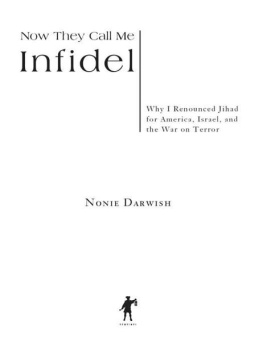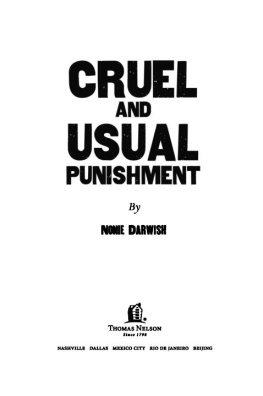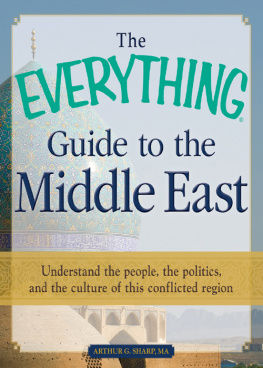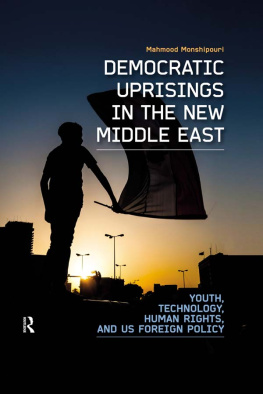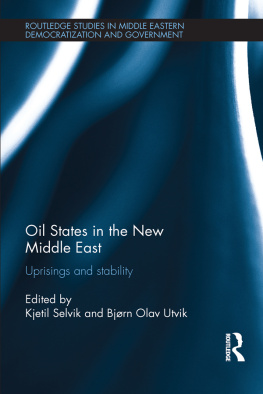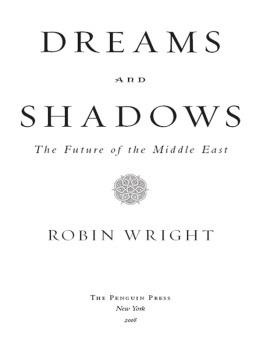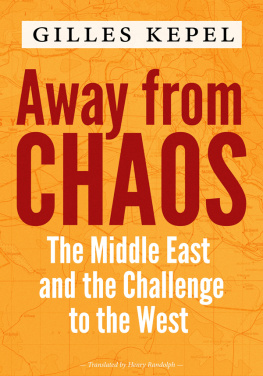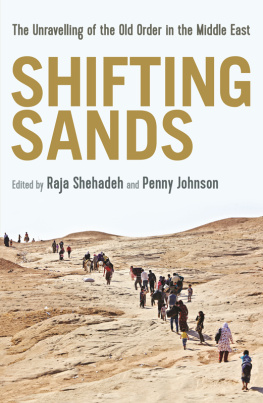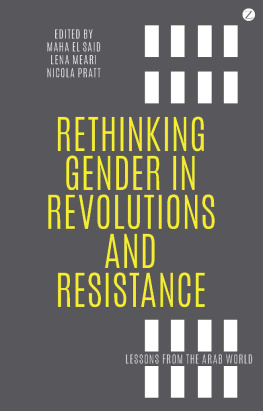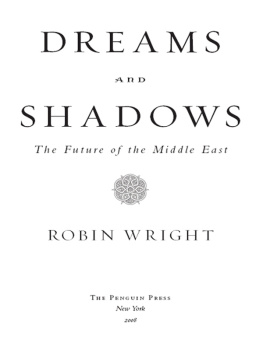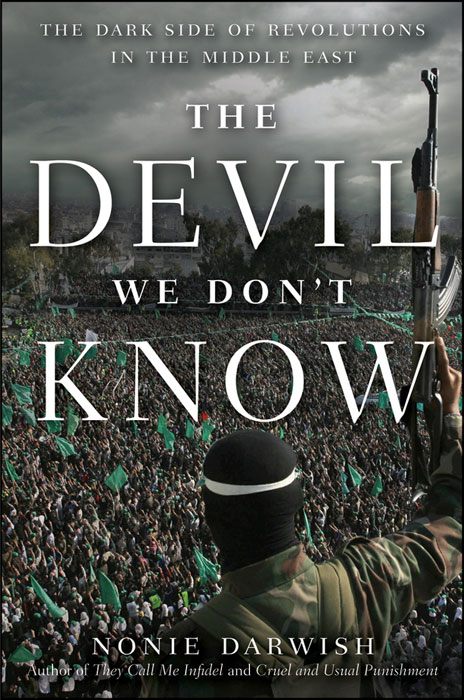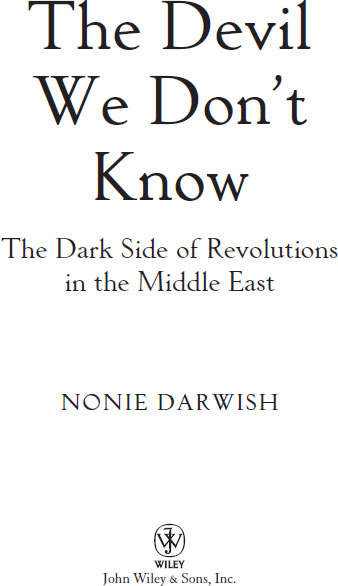Copyright 2012 by Nonie Darwish. All rights reserved
Lyrics to Trading My Sorrows on page 83 by Darrell Evans. Copyright 1998 Integritys Hosanna! Music (ASCAP) (adm. at EMICMGPublishing.com) All rights reserved. Used by permission. International Copyright Secured. All Rights Reserved. Used by Permission.
Photo on page 126 from Al Azhar Mosque and University.
Published by John Wiley & Sons, Inc., Hoboken, New Jersey
Published simultaneously in Canada
No part of this publication may be reproduced, stored in a retrieval system, or transmitted in any form or by any means, electronic, mechanical, photocopying, recording, scanning, or otherwise, except as permitted under Section 107 or 108 of the 1976 United States Copyright Act, without either the prior written permission of the Publisher, or authorization through payment of the appropriate per-copy fee to the Copyright Clearance Center, 222 Rosewood Drive, Danvers, MA 01923, (978) 750-8400, fax (978) 646-8600, or on the web at www.copyright.com . Requests to the Publisher for permission should be addressed to the Permissions Department, John Wiley & Sons, Inc., 111 River Street, Hoboken, NJ 07030, (201) 748-6011, fax (201) 748-6008, or online at http://www.wiley.com/go/permissions .
Limit of Liability/Disclaimer of Warranty: While the publisher and the author have used their best efforts in preparing this book, they make no representations or warranties with respect to the accuracy or completeness of the contents of this book and specifically disclaim any implied warranties of merchantability or fitness for a particular purpose. No warranty may be created or extended by sales representatives or written sales materials. The advice and strategies contained herein may not be suitable for your situation. You should consult with a professional where appropriate. Neither the publisher nor the author shall be liable for any loss of profit or any other commercial damages, including but not limited to special, incidental, consequential, or other damages.
For general information about our other products and services, please contact our Customer Care Department within the United States at (800) 762-2974, outside the United States at (317) 572-3993 or fax (317) 572-4002.
Wiley also publishes its books in a variety of electronic formats and by print-on-demand. Some content that appears in standard print versions of this book may not be available in other formats. For more information about Wiley products, visit us at www.wiley.com .
Library of Congress Cataloging-in-Publication Data:
Darwish, Nonie.
The devil we dont know: the dark side of revolutions in the Middle East/Nonie Darwish. 1
p. cm.
Includes index.
ISBN 978-1-118-13339-2 (cloth); ISBN 978-111-8-19789-9 (ebk); ISBN 978-111-8-19790-5 (ebk); ISBN 978-111-8-19791-2 (ebk)
1. Middle EastPolitics and government21st century. 2. RevolutionsMiddle East. 3. Islam and politicsMiddle East. 4. DemocratizationMiddle East. I. Title.
DS63.18.D37 2012
956.054dc23
2011042288
To Mohammed and Mohammed, two talented young men who left Islam, but are unable to escape the hell of the Islamic state
Acknowledgments
I want to thank my three children for their smiles, love, and support. I especially want to thank my many friends in the Middle East, who kept me informed and inspired me with their courage and convictions.
I also thank my agent, Lynne Rabinoff, for her advice and professionalism.
I am very grateful to my editor Hana Lane, who brought out the best in what I wrote, and, of course, to my publisher, John Wiley and Sons, and all of the staff there for their talent and care.
Introduction
Revolutions across the Middle East are rapidly unraveling before our eyes, telling us the sad truth that Islamic uprisings eventually crawl back to where they came fromback to tyranny. If anyone has any doubt as to the negative dynamics of sharia (the religious law of Islam) and its subversive effect on society, all that person needs to do is study Islamic revolutions and why they eventually fail to achieve their goals of freedom and democracy. If you believe that sharia is a harmless religious law that Muslims have the right to practice wherever they go, I advise you to take a front seat and watch the drama unfold. The reason Islamic revolutions end in failure is because sharia forbids freedom of speech and religion, as well as gender equality and religious equality, and will remove any ruler from office if he refuses to conduct jihad and advocates peace with non-Muslim nations.
Months after the revolution in Egypt, Tahrir Square is still full of rage, anger, and divisiveness, with huge crowds that are still demanding democracy. On July 29, 2011, secularists, who are the minority, planned a sit-in called Friday of Popular Will and Unification when they were overwhelmed by tens of thousands of Muslim Brotherhood and Salafi groups, who called the event Sharia Friday and demanded an Islamic state.
Chants were heard: Obama, Obamawe are all Osama. A large poster read You are in our hearts and we will never forget you and showed photos of Osama bin Laden; Hamas Shaikh Ahmad Yassin; the Libyan fighter Omar Mukhtar; the founder of the Muslim Brotherhood, Hassan al-Banna; the leader of the Brotherhood who was assassinated by President Abdel Nasser, Sayyid Qutb; and the blind man Shaikh Omar Abdel Rahman, who is being held in a U.S. prison. The square was full of Saudi flags symbolizing the Islamist state under Allah and the Islamic sword.
While most nations around the world have realized the failures of theocracy, many Muslims around the world are still carrying signs with the Muslim Brotherhood slogan Islam is the solution. This catchy phrase appeals to the Muslim masses, who have never learned the difference between religion and the political system, and whose votes in the coming elections across the Middle East will decide what kind of political system they will live under. If the slogan carries the day, any secular democracy movement in Cairo or other Arab capitals will be left at the mercy of the pro-sharia majority.
The trend in the Muslim world is toward restoring Allah's law as a political solution, to create the perfect Islamic state that many dream of and that never actually existed. In almost all Muslim countries that have freedom movements today, the constitutions are sharia-based, making it an act of apostasy to attempt to remove sharia from the future constitutions. Not one demonstrator in the streets of Cairo carried a sign asking for the removal of sharia from the new constitution of Egypt's future government, a government that people expect to miraculously bring them freedom and democracy.
The fourteen-hundred-year history of Islam tells us that Muslims have no confidence in secular government. The banner Islam is the solution itself holds democracy in contempt. The questions that Arab revolutionaries today must ask themselves include: Are Muslims confident and secure enough in their faith and its survival to stop requiring the government and the legal system to enforce Islam under penalty of death? Why do Muslims not dare remove sharia from their constitutions? Why do they dread letting go of total control of every aspect of a Muslim's life and the institutions that govern him? What is behind their fears and insecurity? What forces them to rely on government and not on the freedom of the Muslim individual to choose?
The purpose of this book is not simply to criticize Islam or point out Islam's failures in order to tear it down. First and foremost, I want to explain what lies behind the revolutions in the Middle East and to expose Islam for what it is: a belief system that will inevitably doom those revolutions. Islam and its sharia cannot coexist with freedom and democracy.


